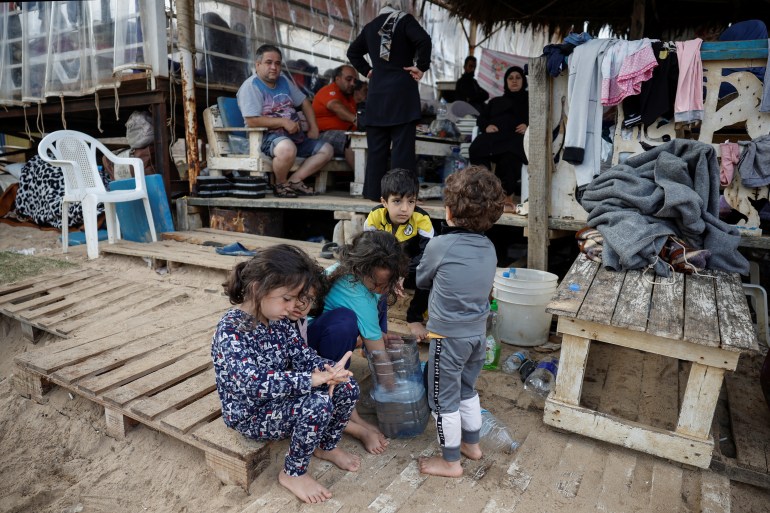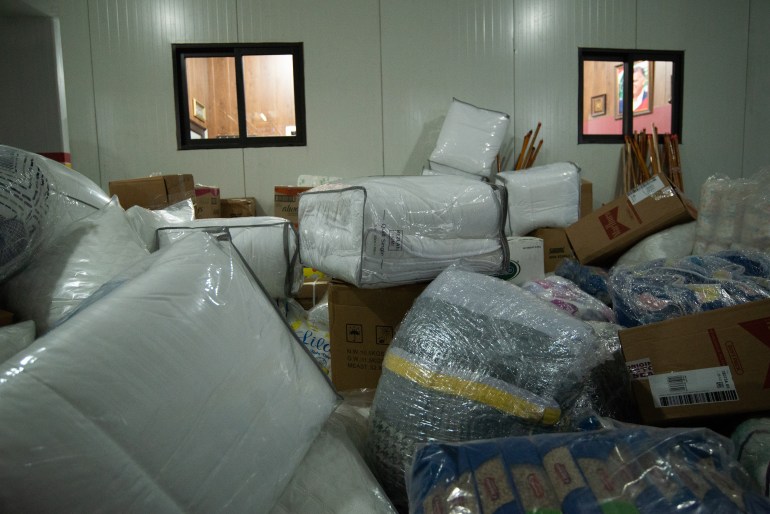Beirut, Lebanon – At Nation Station, a communal kitchen in the Geitawi neighbourhood, volunteers move to and fro, stacking food on a table.
Behind them, others stir meat, cook rice or chop lettuce while trading small talk.
“Fifty meals!”, one of the volunteers shouts out to his comrades, noting a benchmark.
They return the enthusiasm with a communal cheer, without breaking from their tasks.
The volunteers in the petrol station-turned-communal kitchen are working to prepare meals to be delivered to shelters for people who have been forced to flee their homes.
![Volunteers at non-profit organisation 'Nation Station', prepare meals to be distributed for people who were displaced due to Israeli bombardment, in Beirut, Lebanon September 26, 2024. [Mohamed Azakir/Reuters]](https://www.occasionaldigest.com/wp-content/uploads/2024/10/2024-09-27T062015Z_953037793_RC2A8AA8EPTM_RTRMADP_3_ISRAEL-PALESTINIANS-LEBANON-SOUP-KITCHEN-1727423.jpeg)
One million displaced
Before Israel began relentlessly bombarding Lebanon’s south, Bekaa Valley in the east and Beirut’s southern suburbs on September 23, more than 110,000 people had already been displaced from their homes in southern Lebanon during the 11 months of cross-border attacks.
Last Monday’s escalation forced many more to flee and the situation became even more dire on Friday when Israel levelled an entire block in a southern suburb of Beirut while assassinating Hezbollah’s Secretary-General Hassan Nasrallah and other officials from the group.
The Israeli army then demanded that large parts of Beirut’s suburbs, already reeling from the previous week’s attacks, evacuate.

In the days that followed, Prime Minister Najib Mikati said as many as one million people, or about one-fifth of the country’s residents, were displaced.
Lebanon’s Ministry of Education designated a number of schools as temporary shelters for the displaced, while the occupancy of hotels and rented apartments spiked.
But beyond that, the Lebanese state’s capacity is limited.
The country is in its fifth year of a devastating economic and banking crisis, which experts largely blame on the ruling political class.
Picking up the slack
In the space where the government, the United Nations or international NGOs fall short, initiatives like Nation Station fill the gaps.
“Nation Station started the day after the August 4th explosion in 2020,” Josephine Abou Abdo, the cofounder of Nation Station, told Al Jazeera.
“We responded to emergency needs back then and since the Israeli aggression on Monday, we’ve cooked meals for those in need.”
The volunteers cook breakfast, lunch and dinner for the displaced people, to be delivered to the shelters.
In total, they make 700 portions of food daily. To make so many meals is taxing and Abou Abdo says the group is actively seeking volunteers to help feed the displaced.
Others who aren’t part of initiatives like Nation Station have also stepped up, taking families into their homes, donating blood, or distributing water to people stranded on the highways.
‘Influencers’ in action
In Beirut’s Ramlet al-Bayda neighbourhood, some students move busily back and forth. The constant drone of the air circulation system drowns out the sound of chatter. Students are split into groups, some build boxes, while others fill them with staples like dry food, water, or cleaning supplies. Once the boxes are finished, the groups form an assembly line to pass them into a parked white van as a young man gives instructions.
Once full, the vans depart for parts of the country where the need is most desperate.
![In Beirut’s Ramlet al-Bayda neighbourhood, a group of students prepare boxes of aid for the displaced, Sept 27, 2024 [Lina Malers/Al Jazeera]](https://www.occasionaldigest.com/wp-content/uploads/2024/10/DSC_3642-2-1727848057.jpg)
This initiative was started by three social media influencers, Ghena Sandid, Farah Dika, and Sara Fawaz. The trio, who have no organisation or association and have not even named their initiative, mobilised their followings to secure a free space – an underground parking garage – to organise and send out the aid.
People from abroad have also been donating money for the relief efforts. But with Lebanon’s banking system collapsing in 2019, many fundraising efforts have run into trouble getting that money to Lebanon. To circumvent that, Dika told Al Jazeera that Western Union had lifted her transfer limit.
“At first, we thought the initiative would be small with only ten to 15 people helping,” Sandid said. “That number quickly turned into around 450 students. They’ve provided aid to over 50 schools across 30 regions in Lebanon.”
‘We’re all the same’
Outside the garage, teenager Zoey Zein stood with a group of her friends. “I came to help because I want people to know there are people that are helping as long as they need.”
This mobilisation has provided aid to thousands of people, but the groups are struggling to keep up with the ever-increasing number of displaced.

“One problem we face is that at first, we needed to serve 1,000 people,” Dika said. “Now that number is at 5,000.” Dika was speaking to Al Jazeera on Friday afternoon, just a few hours before the strikes that killed Nasrallah.
Since then, the number of people forced from their homes has soared. Many have taken to sleeping in parks or by the seaside.
Down in the garage, a van’s loading area is filled with goods. The volunteers close the doors and a few climb inside. Jad Jaafar, 21, sat in the passenger seat. He volunteers about six or more hours a day. “I’m trying to help,” he said. “There are people who can’t stay in their homes, so we need to go out and help them.”
“I’m from Baalbek,” he added, referring to Lebanon’s eastern region. “Next to me is a Beiruti and a northerner, and someone from the mountain. We’re all the same.”